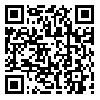Volume 5, Issue 3 (12-2022)
2022, 5(3): 0-0 |
Back to browse issues page
Ethics code: IR.MEDILAM.REC.1400.056
Download citation:
BibTeX | RIS | EndNote | Medlars | ProCite | Reference Manager | RefWorks
Send citation to:



BibTeX | RIS | EndNote | Medlars | ProCite | Reference Manager | RefWorks
Send citation to:
Sadeghifar J, nargesi S, dolatshahi Z. Economic Evaluation of Diagnostic Methods of Covid-19: A Systematic Review. Journal title 2022; 5 (3)
URL: http://newresearch.medilam.ac.ir/article-1-1447-en.html
URL: http://newresearch.medilam.ac.ir/article-1-1447-en.html
Abstract: (2193 Views)
The new coronavirus, known as SARS, causes severe respiratory illness. The incubation period is about 6 days. Early symptoms include chills, lethargy, dizziness, cough and sore throat, and shortness of breath appears after a few days. Many patients have abnormal chest radiographs. Some cases progress rapidly to acute respiratory distress and require respiratory support (artificial respiration). Death is the result of progressive respiratory failure, which is about 10% higher in middle-aged mortality.
Laboratory tests are not usually performed to diagnose coronavirus infections except in the case of SARS. The available methods for coronavirus detection include SARS-Cov, detection of RNA virus genome in the respiratory tract and fecal samples by RT-PCR. Isolation of coronaviruses is difficult and requires (biosafety level 3) conditions for SARS-Cov.
Economic evaluation of coronavirus diagnostic tests can play an important role in informing decision makers about reimbursement of care costs, pricing of medical interventions, providing cost-effective clinical guidelines on the use of diagnostic methods, providing targeted interventions, and producing scientific evidence. Have a policy to make decisions and ultimately lead to cost management, efficiency and optimal allocation of limited financial resources of the health system in the field of viral and infectious diseases economics. . Therefore, the present study systematically reviews and focuses on patients with coronary artery to evaluate the diagnostic tests of this disease.
Laboratory tests are not usually performed to diagnose coronavirus infections except in the case of SARS. The available methods for coronavirus detection include SARS-Cov, detection of RNA virus genome in the respiratory tract and fecal samples by RT-PCR. Isolation of coronaviruses is difficult and requires (biosafety level 3) conditions for SARS-Cov.
Economic evaluation of coronavirus diagnostic tests can play an important role in informing decision makers about reimbursement of care costs, pricing of medical interventions, providing cost-effective clinical guidelines on the use of diagnostic methods, providing targeted interventions, and producing scientific evidence. Have a policy to make decisions and ultimately lead to cost management, efficiency and optimal allocation of limited financial resources of the health system in the field of viral and infectious diseases economics. . Therefore, the present study systematically reviews and focuses on patients with coronary artery to evaluate the diagnostic tests of this disease.
Received: 2021/04/28 | Accepted: 2021/06/20 | Published: 2022/10/10
Send email to the proposal executer
| Rights and permissions | |
 | This work is licensed under a Creative Commons Attribution-NonCommercial 4.0 International License. |



